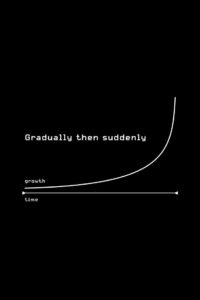
Editor’s Note: This Sunday, I am traveling to southern Minnesota to deliver my first-ever presentation on “The Future of Faith.” Here is how the talk is being billed: Spiritually, Jack Uldrich identifies himself as a contemplative Celtic Christian. He is also the best-selling author of 13 books and a noted global futurist. In this engaging and thought-provoking 25-minute presentation, Uldrich will outline how the convergence of three political, technological and ecological trends (the rise of authoritarianism, accelerating advances in artificial intelligence, and climate change) are pointing toward a future in which faith not only becomes more prominent, it also holds the key to unlocking and unleashing humanity’s continued spiritual evolution. A spirited and open-minded–and opened-hearted–conversation will follow. (The talk is free and open to the public. If you have a group or community organization that may be interested in the topic, please feel free to contact me. This talk is always given free of charge.)
Thought Leadership: The world can change fast. Less than two weeks ago, the Trump Administration announced a $175 billion plan to create a “Golden Dome” capable of shooting down incoming long-range missiles. As this week’s stunning Ukrainian drone attacks on Russian aircraft demonstrate, the $175 billion dome may be this century’s equivalent of France’s ill-fated “Maginot Line.” The threat the U.S. faces is not simply from incoming missiles from Russia or China; it may instead be from super cheap $400 drones hidden in shipping containers and capable of launching only miles from their intended targets–be they long-range bombers, aircraft carriers, or even critical power plants. On a related note, Ukraine’s attack may have a broader impact on military planning than many people expect. To better deal with the threats of the future, the U.S. military may have to be redeployed across the country on a smaller, more decentralized basis in order to better protect our now suddenly vulnerable infrastructure assets.
Think Quick: In this piece, How the Future Will Arrive: Gradually and Then Suddenly, I explain how quickly the national debt, artificial intelligence, and climate change can change our world. Exactly when the world will change is difficult to predict, but we must all prepare ourselves for the possibility that all of these seemingly “gradual” problems have the potential to metastasize into big problems quite SUDDENLY. Forwarded is forearmed.
Think Harder: A self-described “tech bro” is now planning on using CRISPR (gene editing) technology on embryos. The stated plan is to use the technology to cure individuals (while they are still embryos) of certain ailments, including Alzheimer’s and heart disease. There is, however, a great amount of dis-ease over the idea that the same technology could be this century’s equivalent of Eugenics. Before society rushes headfirst down this path, it would be wise to stop and contemplate the potential unintended consequences of deploying this powerful tool too soon. As a starter, it is fair to ask ourselves whether only wealthy people will have initial access to this powerful new tool.
Think Again: Expect discussion over a 4-day work week to continue to pick up steam. Last week, the Wall Street Journal had an interesting piece on the growing number of companies adopting a 4-day work week, and this article on Iceland’s now 6-year-long experiment with a 4-day work week shows that there is little to no loss in overall productivity when converting to a shorter work week. As AI continues to eliminate a growing number of jobs, one potential solution for dealing with wide-scale job displacement is to explore shorter work weeks as a method for keeping more people gainfully employed.
Thoughts from Beyond: Spiritward! The direction of the future is neither forward nor backward. The direction of the future is Spiritward. In a world where trust is becoming an ever more precious commodity, and where accelerating advances in AI and gene editing technology are challenging long-standing ideas about what it means to be human, and where the reality of climate change is becoming ever more clear, it is my opinion that matters of spirit are going to rise to the fore. This renewal of “spirituality” (which I define broadly to include the “human spirit,” a divine presence, and a deeper sense of interconnectedness with nature and one another) will represent a positive alternative to how the future may unfold.
